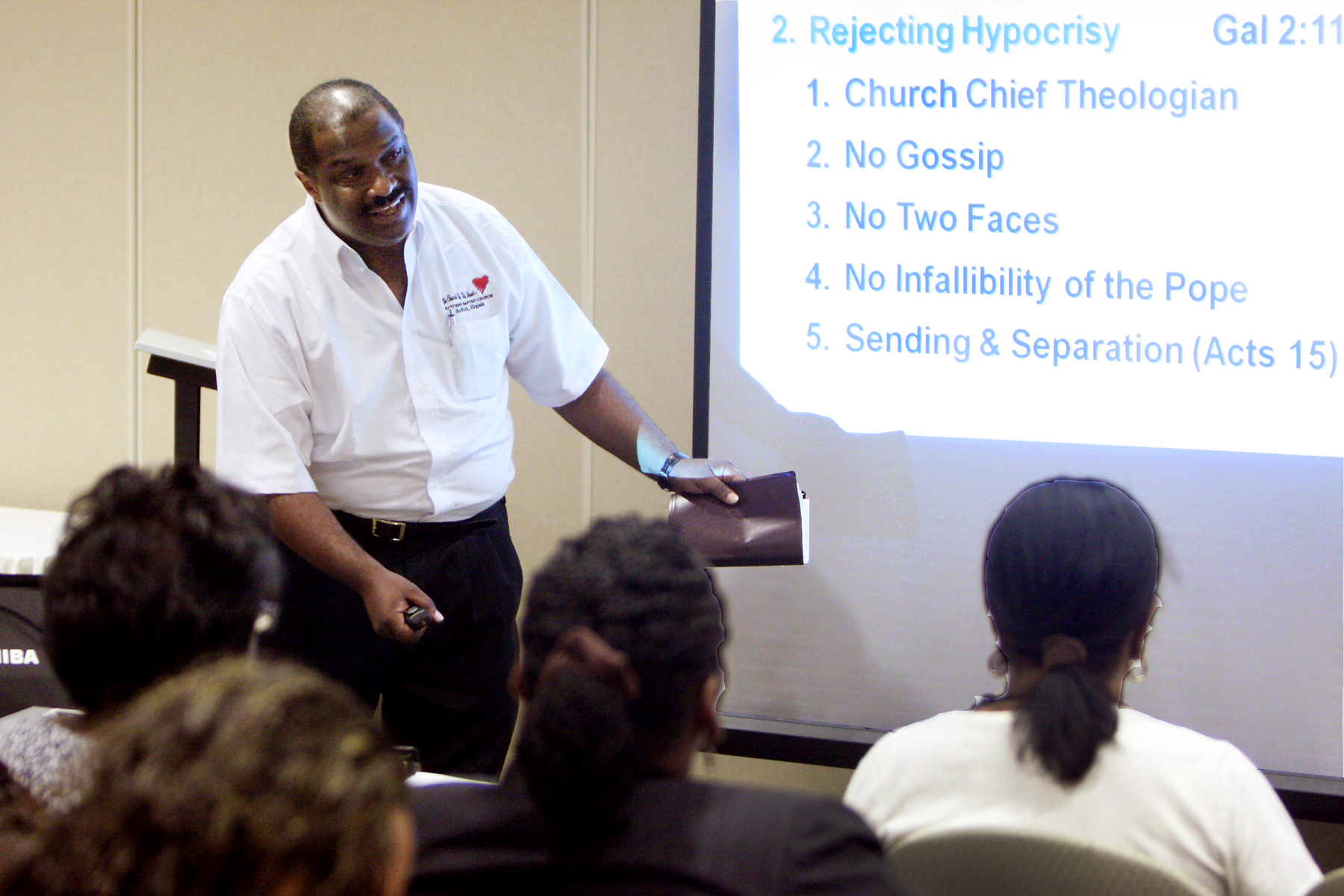
RIDGECREST, N.C. (BP)–At East End Baptist Church, January Bible Study is a big event.
“I get more people who start off the year in January Bible Study (JBS) than any other time,” said Mark Croston, senior pastor of the Suffolk, Va., congregation. “I guess they just want to start the year off right.”
Croston taught “The Truth About Grace,” the 2011 JBS based on the New Testament’s Book of Galatians, during Black Church Leadership and Family Conference at LifeWay Ridgecrest Conference Center in North Carolina.
Since the former Baptist Sunday School Board (now LifeWay Christian Resources) inaugurated JBS in 1948, participating churches have spent eight hours of time in in-depth study of God’s Word, focusing on the same book of the Bible or portions of a Bible book. Each year the first full week of January is set aside on the Southern Baptist denominational calendar for JBS; however, many churches move this to a time more suited to their needs.
Croston, in his JBS session during the gathering of black church leaders in mid-July, defined grace as God’s design for reconciling humanity to Himself through Jesus Christ.
“Galatians defends the grace of God,” the pastor said. “The fact is that God couldn’t love you any more and God couldn’t love you any less. It’s about His grace, not your work.”
Croston added that everyone — Christian and non-Christian — benefits from the grace of God.
“If you’re saved, you’ve experienced God’s grace,” he said. “If you’re not saved, you’ve experienced God’s grace. How? You’re up walking around and your blood is flowing.”
Croston reviewed the setting of the Book of Galatians: It was written in the first century by the Apostle Paul; the recipients were believers in the churches located in the province of Galatia; the occasion for the letter was the emergence of false teaching in the Galatian churches; and the central message is that salvation comes by God’s grace, not through human effort.
The church at Galatia was a hotbed of legalism, Croston noted. Addressing the characteristics of legalism, he said it threatens the truth of the Gospel, is susceptible to promoting hypocrisy, results in joyless religious faith, demonstrates misguided enthusiasm, is highly contagious within a church, and results in tumultuous relationships.
“There is also slavery in legalism that leads to bondage,” Croston said. “Whenever you think about living up to the expectations of others, that’s bondage. Craving the approval of others is bondage. Trying to maintain the façade of reputation is bondage. Striving to keep God’s commands through human strength is bondage.”
All churches have their own “rules” about what is right and wrong, Croston said, adding that many of these “rules” have nothing to do with Scripture.
“Your church probably has a ‘rule’ about what to wear, where to sit, what food to bring to the potluck,” the pastor said. “Those aren’t in Scripture, so we shouldn’t worry about it.
“My wife passed in 2008 from cancer,” he said. “I never knew there were so many rules for widows and widowers. Rules about how long you can mope along, when you can go out on a date, how many times you can cry in the pulpit! Rules! Not Scripture! Rules!”
Grace is separate from the law, Croston said, explaining, “The real purpose of the law was to show us that we never will be able to measure up. Through the law we see our need for grace.
“We can’t lose our salvation because it was never up to us anyway,” Croston said.
“God bound Himself to us. I’m saved and continue to be saved, not because I’m so good, but because God will not let me go,” the pastor said. “I am bound to Him. I am saved and secured by grace!”
Looking around the room of about 60 people, Croston said, “We look different. We act different. But what unites us -– the belief in our salvation from the Lord Jesus Christ -– is much stronger than anything that divides us.”
Croston said that unlike the church in Galatia, circumcision isn’t the dividing issue in today’s churches. But, he added, all churches have their issues.
“What is it in your church that is legalistic?” he asked. “We have to let go of the things that aren’t essential.”
In Galatians, Paul reminded the church that the trouble with trusting in the law for salvation is that all the law must be kept, Croston said. All of it. Offending the law in one place offends all of the law.
“He [Paul] said what matters is that you have faith working through love,” Croston said. “You have to keep looking at your love barometer. Are you preaching with love? Are you ushering with love? Are you teaching, singing and sharing with love?”
Just as Paul challenged the false teachers in Galatia, Christians have a responsibility to challenge false teachers today, Croston said.
“You have to be in the Book [the Bible] too,” he said, “You have to know the Book so you will be able to recognize false teaching. You also have to know the Book so you can judge yourself. The Bible is like a mirror. You see what you look like in contrast to the Bible.”
–30–
Polly House is a corporate communications specialist with LifeWay Christian Resources of the Southern Baptist Convention.













